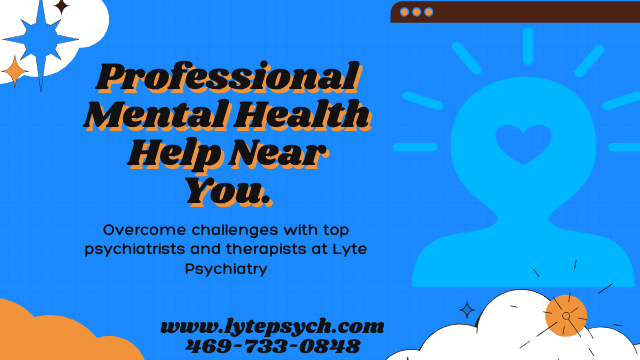Wed Jun 12 2024
Overcoming Mental Health Challenges with Professional Help from Top Psychiatrists and Therapists Near You (Affordable Adults and Adolescents Therapist and Psychiatrist Near You) Best Therapist and Psychiatrist Near You Dallas, Fort Worth, TX

Overcoming Mental Health Challenges with Professional Help from Top Psychiatrists and Therapists Near You (Affordable Adults and Adolescents Therapist and Psychiatrist Near You)
Mental health is an integral part of our overall well-being. Yet, many individuals struggle with various mental health challenges, often in silence. Recognizing these challenges and seeking professional help is a crucial step towards recovery and a healthier, more fulfilling life. In this article, we'll explore how top psychiatrists and therapists can assist in overcoming mental health challenges, and why professional support is indispensable.
Understanding Mental Health Challenges
Anxiety Disorders: Characterized by excessive worry and fear, anxiety disorders can severely impact daily functioning. Common forms include generalized anxiety disorder, social anxiety disorder, and panic disorder.
Bipolar Disorder: Marked by extreme mood swings, including emotional highs (mania or hypomania) and lows (depression). It affects energy levels, activity, judgment, and behavior.
Post-Traumatic Stress Disorder (PTSD): Develops after experiencing or witnessing a traumatic event. Symptoms include flashbacks, nightmares, severe anxiety, and uncontrollable thoughts about the event.
The Role of Psychiatrists and Therapists
Psychiatrists are medical doctors specializing in diagnosing and treating mental health disorders. They can prescribe medications, conduct physical exams, and provide therapy. Their medical background enables them to understand the complex interplay between mental and physical health.
Benefits of Seeking Professional Help
Accurate Diagnosis: Professional evaluation ensures an accurate diagnosis, which is critical for effective treatment. Misdiagnosis can lead to ineffective treatment and prolonged suffering.
Personalized Treatment Plans: Psychiatrists and therapists create personalized treatment plans tailored to each individual’s unique needs. This may include medication, therapy, lifestyle changes, or a combination of these.
Medication Management: For many mental health conditions, medication can be a crucial part of treatment. Psychiatrists can prescribe and manage medications, adjusting dosages as needed to ensure effectiveness and minimize side effects.
Therapeutic Techniques: Therapists use evidence-based techniques such as cognitive-behavioral therapy (CBT), dialectical behavior therapy (DBT), and exposure therapy to help patients develop coping strategies and change negative thought patterns.
Support and Accountability: Regular sessions with a therapist provide ongoing support and accountability. This consistent support can be vital for individuals working through complex and persistent mental health challenges.
Overcoming Stigma
One significant barrier to seeking help is the stigma associated with mental health issues. Many people fear judgment or discrimination if they admit to needing help. Education and open conversations about mental health can help reduce stigma, encouraging more people to seek the support they need.
How to Find the Right Professional Help
Finding the right psychiatrist or therapist involves several steps:
Research: Look for qualified professionals with experience in treating your specific condition. Websites like Psychology Today and American Psychiatric Association provide directories of licensed professionals.
Referrals: Ask your primary care physician for referrals. Friends or family members who have had positive experiences with mental health professionals can also be valuable sources of recommendations.
Call to Action: Seek Professional Help with Lyte Psychiatry & Schedule an Appointment (Best Adults and Adolescents Near You)
If you or a loved one are struggling with mental health challenges, professional help is available. Lyte Psychiatry offers comprehensive mental health services with top psychiatrists and therapists dedicated to your well-being. Don’t wait—reach out today to start your journey toward better mental health.
To Schedule an appointment. Click Here
To see our services. Click Here
Call us if you have questins at 469-733-0848
FAQs
Q: What are the signs that I need to see a psychiatrist or therapist?
A: Common signs include persistent feelings of sadness or anxiety, drastic changes in mood or behavior, difficulty coping with daily life, and thoughts of self-harm or suicide. If you're unsure, it's always best to consult with a professional.
Q: Can mental health conditions be cured?
A: While some mental health conditions can be effectively managed with treatment, many are chronic and require ongoing management. However, with the right treatment plan, individuals can lead healthy, fulfilling lives.
Q: How do I know if my treatment is working?
A: Signs of effective treatment include improved mood, better coping skills, and reduced symptoms. Regular check-ins with your psychiatrist or therapist can help assess progress and make necessary adjustments.
Q: What should I do if I’m in a crisis and need immediate help?
A: If you're in immediate danger or experiencing a mental health crisis, call emergency services or go to the nearest emergency room. You can also contact crisis hotlines such as the National Suicide Prevention Lifeline.